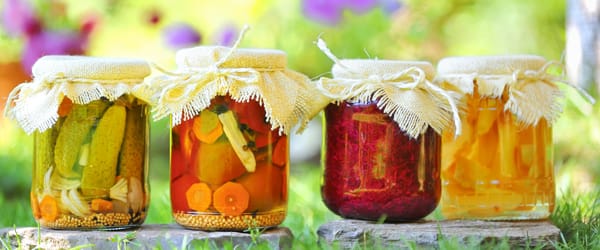
Fermentation is an ancient process for preserving foods and promoting health. Since Neolithic times, humans have been making some of our favorite fermented foods – bread, cheese, beer, and wine – and this practice has spread over time to include fermented milk products (e.g., yogurt), sauerkraut, pickles, vinegar, and much more . Many medical and scientific studies have confirmed that fermented foods help people stay healthy because the fermentation process creates an ideal environment for beneficial microorganisms to thrive, resulting in a probiotic-rich food. Probiotics are the microscopic organisms, the “friendly bacteria” that work to maintain healthy gut flora. With the right mixture of bacteria, your gut can more easily break down food, support immunity, and even contribute to positive mental health.
Each person has his or her own unique bacterial microbiome, and modern living tends to deplete beneficial gut flora. A study comparing the gut flora of the Yanomami, an indigenous, hunter-gatherer Amazonian tribe, to the gut flora of Americans revealed that the Yanomami had two times more microbial diversity in their gut flora . Modern diets, rich in sugar and refined carbohydrates, cause non-beneficial yeasts to flourish in the gut. This can lead to SIFO, small intestinal fungal overgrowth. SIFO can cause any number of health problems, including chronic GI problems (diarrhea, nausea, gas, constipation), brain fog, depression, joint pain, and increased allergy symptoms. With imbalanced gut flora, yeast can thrive and transform into a fungal infection. Most often antibiotics are prescribed to deal with this, which, in most cases, wipe out the good bacteria we need to maintain optimal health. The good news is that probiotics can be added to the diet in order to elevate the levels of good bacteria, thus supporting healthy gut flora.
Benefits of Fermentation
- It is cost-effective. Fermented food can deliver 100 times more probiotics than supplements.
- It helps detoxify the body. Fermented foods contain acid that binds to toxic heavy metals, so that they may be flushed out of the GI tract.
- It provides important nutrients. K2 and B vitamins are found in abundance in fermented foods.
- It increases gut biodiversity. Healthy gut flora is important for digestion and immunity.
Once you see how easy it is to ferment summer vegetables, don’t be surprised if you become hooked. While many fermenting recipes require a starter culture, we are presenting a simple cabbage recipe that uses sea salt. As there are few ingredients needed for fermenting, it is important that each one be of the highest quality. For example, choose organic vegetables, good-quality salt (fermenting with iodized table salt and kosher salt is not recommended – the iodine in table salt and the anti-caking agents often found in both of these salts limits the amount of resulting beneficial bacteria ), and if using water, make sure it is filtered.
Cabbage is an excellent fermentation vegetable because it is high in vitamin K and vitamin C. Cabbage sauerkraut is an excellent place to start when fermenting because it’s easy and delicious!
Click here for an easy sauerkraut recipe by fermentation expert Sandor Katz.
Once you’re comfortable with fermenting cabbage, you can try diving deeper into the amazing world of pickling and preserving.
Two thousand years ago, Hippocrates said that all disease starts in the gut. Today we’re learning that the reverse is also true. Fermentation is a time-tested process for preserving summer produce and supporting optimal health. With practice and patience, you can incorporate homemade fermented foods into every meal.
Interested in taking your nutrition education to the next level? Check out our programs!
Natural Chef |
Nutrition Consultant |
Online Nutrition Consultant |
Sources
[1]http://www.soyinfocenter.com/HSS/fermentation.php
[1][1] http://paleoleap.com/importance-gut-flora-immune-system/
[1] http://www.scientificamerican.com/article/mental-health-may-depend-on-creatures-in-the-gut/
[1]https://books.google.com/books?id=w3JACQAAQBAJ
Herron, JG. The Gut Health Protocol: A Nutritional Approach to Healing SIBO, Intestinal Candida, GERD, Gastritis, and Other Gut Health Issues.
vi http://www.culturesforhealth.com/choosing-salt-fermenting-culturing


